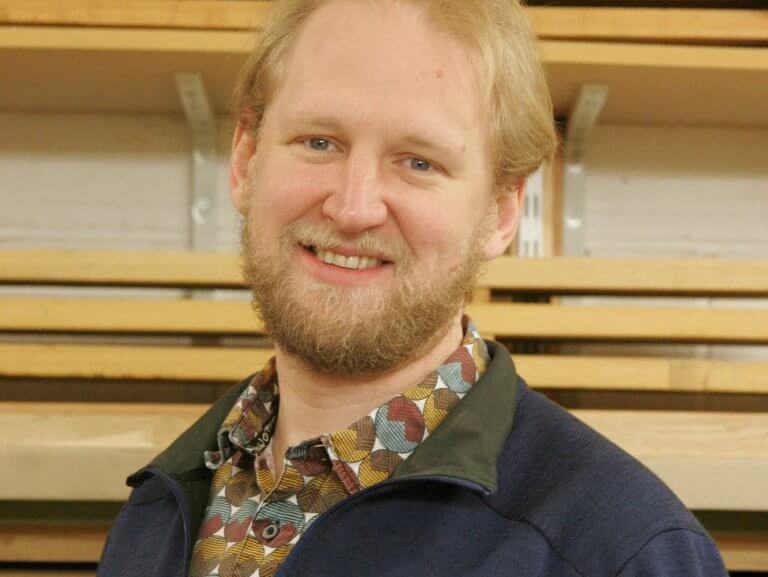
This month’s sustainable journey story is from Rob Cole, owner and managing director of Sheffield Sustainable Kitchens.
Rob is also one of the founding members of Sheffield Sustainability Network.
Q: When did you start thinking about sustainability in terms of your business?
Sustainability has always been important to me personally, but looking at how I can contribute to sustainability in terms of business started around 2008. I was working as a kitchen fitter, contracting for a few different companies, and became increasingly frustrated with the waste in the kitchen industry.
Good quality kitchens which had only been installed a few years before were being skipped and replaced, and the replacements were often lower quality material and design. No-one seemed to care about the impact of all this waste! Around this time I was approached by a few contacts to design and install their kitchens. As a keen cook who understands the importance of kitchen layout and with my previous kitchen fitting experience, I jumped at the chance to do this work – but it was important to me to do things differently. The business grew from this starting point.
Sustainability was so important, yet unconsidered in the industry at that time, so much so that I decided to use the word Sustainable in my business name – Sheffield Sustainable Kitchens. Our product offer and ways of working are a key differentiator within our industry. We have invested in researching alternative materials and can offer a range of high recycled content options for cabinetry and worktops, as well as using local and reclaimed timbers. In some cases we find the existing kitchen cabinetry is in good condition, or can be extended or reused with new doors and worktops, in this situation we offer a refurbishment service.
As well as the materials, it is important that the kitchens last a long time. We ensure that all components that go into our kitchens are up to the job and will stand the test of time. All our kitchens are as individual as our customers, a lot of time is invested to ensure the design and kitchen layout is right for the customer today and for many years to come.
Q: What kind of day-to-day challenges have you faced, following this business principle? How difficult did you find it to carve a niche?
I think there have been highs and lows over the years. There have been moments where it has been difficult to stick to the ethics and values we started out with, especially when the business was still very small and resources were limited. It can take more time to research and source sustainable products, but it is important to take these steps where we can.
There is definitely a challenge with communicating the small details which mean our product will last longer than a competitor’s. On the other hand, because we invested time in finding the sustainable materials and approaches which differentiate us, we were able to position the business as unique in our industry. I believe that our distinct offer helped us weather the tough times following the Global Financial Crisis, which affected many other businesses operating in this market.
Over the years it has become easier, there are more options available to us now than there were back then, and the needs of the consumer have shifted firmly towards more sustainable products like ours. That said, we still continue to keep sustainability at the top of our agenda. There is always more that we can do to improve, and things change continuously as a business grows, suppliers improve and the sustainability challenges develop.
Q: Do you think there is more of a market for sustainable products or in consumers supporting sustainable businesses now than say five years ago?
Definitely. I think consumers demand more now than they ever have, and sustainability is a high priority for a lot of people. We live in the age of Greta Thunberg and David Attenborough highlighting environmental issues to the world. Increasingly, consumers are aware of the issues of climate change and are moving away from products which don’t shape up. Sustainable products are the future and I think we’ll see consumers leave behind products and brands which are unsustainable or engage in greenwashing.
For us, we are finding more and more high quality sustainable products are available. For example, a commonly known material for kitchen benchtops is quartz which includes quarried stone and heavy industrial processing and are shipped in from overseas. However, there are more sustainable alternatives in the UK which turn waste glass into beautiful and hardwearing benchtops, which we have used for many kitchen projects over the years.
Q: What advice would you give to someone who perhaps has a similar business to yours who wanted to be more sustainable, but might not know where to start?
In our industry materials are key. Could you bring in some materials which are more sustainable, locally produced etc? What can you do to make your product last longer? Even the basics in your business operations such as switching to renewable energy supply, reducing your transport miles, encouraging staff to use active travel etc. can all make a difference and help move you in the right direction. And really importantly, if you’ve made some positive changes, then make sure you shout about them.
This is a low carbon Instadesign website on sustainable hosting.